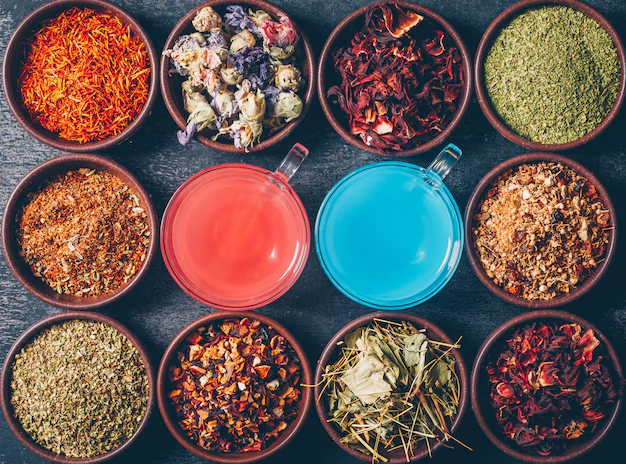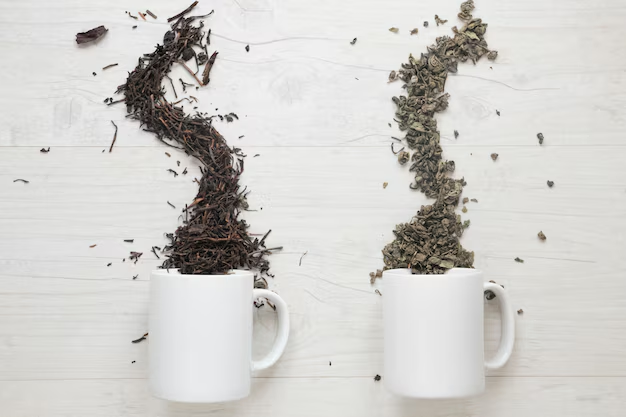Herbal teas have become increasingly popular in the United States, captivating the attention of health enthusiasts and tea lovers alike. Unlike traditional teas, which come from the Camellia sinensis plant, herbal teas are made from an array of herbs, flowers, fruits, and spices. This unique composition sets them apart from their caffeinated counterparts.
But here’s the question many ask: Does herbal tea have caffeine? The answer might surprise you. Let’s explore the world of herbal teas to uncover their caffeine content and what makes them a beloved choice for many.
What Is Herbal Tea?
Herbal tea, often called a tisane, is a beverage made by steeping various plant components, such as leaves, flowers, seeds, or roots, in hot water. Unlike traditional teas like green, black, or oolong, herbal teas do not originate from the Camellia sinensis plant. This fundamental difference gives herbal teas their unique characteristics and health benefits.
Key Differences Between Herbal Teas and Traditional Teas
- Source: Traditional teas come from the Camellia sinensis plant, while herbal teas use a mix of herbs, flowers, and fruits.
- Caffeine Content: Traditional teas contain natural caffeine; herbal teas are generally caffeine-free.
- Flavor Profiles: Herbal teas offer a broader range of flavors, from fruity to spicy, due to their diverse ingredients.
Is Herbal Tea Really Tea?
Technically, herbal tea is not tea in the traditional sense. The term “tea” is reserved for beverages made from the Camellia sinensis plant. Herbal tea is better classified as a tisane, a French word for infusions made from plants other than tea. While the term “tea” is commonly used for convenience, it’s important to note this distinction.
This misnomer doesn’t diminish the appeal of herbal teas—they remain a healthy and flavorful choice for many.
Does Herbal Tea Contain Caffeine?
The good news for those avoiding caffeine is that most herbal teas are naturally caffeine-free. This is because they are not derived from the Camellia sinensis plant, which produces caffeine as a natural stimulant.
Comparison: Herbal Teas vs. True Teas
- Herbal Teas: Made from herbs, flowers, and fruits; typically caffeine-free.
- True Teas (Green, Black, White): Contain natural caffeine, providing an energy boost.
For those sensitive to caffeine or looking for a relaxing beverage, herbal teas are an excellent alternative to traditional teas.
Exceptions to the Rule: Herbal Teas with Caffeine
While most herbal teas are caffeine-free, there are exceptions. Certain herbal blends contain natural caffeine due to specific ingredients. Here are a few examples:
- Yerba Mate: A South American herbal tea known for its high caffeine content, comparable to coffee.
- Guayusa: A cousin of yerba mate, this Amazonian plant also contains significant amounts of caffeine.
- Cacao Tea: Made from cacao shells, it offers a mild caffeine boost along with a chocolatey flavor.
These teas are ideal for those seeking an herbal alternative to coffee while still enjoying a caffeine kick.
Types of Herbal Tea

The variety of herbal teas available is vast, each offering unique flavors and health benefits. Here are some of the most popular options in the U.S.:
1. Chamomile Tea
Known for its calming properties, chamomile tea is a go-to for relaxation and improved sleep. Its floral aroma and mild taste make it a favorite for winding down at the end of the day.
2. Peppermint Tea
This refreshing tea is famous for aiding digestion and soothing an upset stomach. Its cool and minty flavor is invigorating and caffeine-free.
3. Hibiscus Tea
Vibrant and tart, hibiscus tea is rich in antioxidants and vitamin C. It’s often enjoyed cold and is known to help support heart health.
4. Rooibos Tea
Also called “red tea,” rooibos comes from South Africa and is packed with antioxidants. It has a naturally sweet and nutty flavor, making it a comforting choice.
5. Ginger Tea
A spicy herbal tea, ginger tea is celebrated for its ability to reduce nausea, improve digestion, and boost immunity. It’s a popular choice during colder months.
6. Lemon Balm Tea
With its light citrus flavor, lemon balm tea is known for its calming effects. It’s often used to reduce stress and promote relaxation.
Caffeine-Free Teas vs. Herbal Teas
While herbal teas are naturally caffeine-free, there’s a distinction between them and decaffeinated teas. Decaffeinated teas are true teas (like black or green) that have undergone processing to remove most of their caffeine. However, trace amounts of caffeine often remain.
In contrast, herbal teas are naturally caffeine-free, making them an excellent option for those who want to avoid caffeine entirely without relying on decaffeination processes.
Health Benefits of Herbal Tea
Herbal tea is more than just a flavorful drink; it’s a powerhouse of wellness benefits. From calming your mind to boosting digestion, herbal teas cater to various health needs. Let’s take a closer look at what makes them so beneficial.
For Relaxation
Stress and anxiety can take a toll on your well-being. Herbal teas like chamomile and lavender are famous for their calming effects. Chamomile tea is a natural sedative, often used to promote better sleep and reduce stress. Lavender tea, on the other hand, helps soothe nerves and create a sense of tranquility.
These teas work by interacting with the brain’s neurotransmitters, helping to reduce feelings of anxiety and restlessness. For a peaceful evening, nothing beats a warm cup of chamomile or lavender tea.
For Digestive Health
Digestive issues? Herbal teas like peppermint, ginger, and fennel can be your go-to remedies. Peppermint tea is well-known for its ability to ease bloating and indigestion. It contains menthol, which relaxes the gastrointestinal muscles and improves digestion.
Ginger tea is a powerhouse for nausea relief, often recommended for morning sickness or motion sickness. Fennel tea, with its subtle licorice-like flavor, helps reduce bloating and supports overall gut health. These teas offer natural, gentle solutions for keeping your digestive system on track.
Herbal Tea and Pregnancy
Pregnant women often turn to herbal teas for their comforting and supportive properties. However, it’s important to choose the right ones. Raspberry leaf tea is a popular choice during the later stages of pregnancy, as it is believed to tone the uterine muscles.
On the other hand, teas like licorice root, sage, or peppermint in excessive amounts should be avoided due to potential risks. Always consult your healthcare provider before introducing any herbal teas during pregnancy.
Herbal Tea vs. Regular Tea
When comparing herbal tea to traditional tea, several factors stand out, including caffeine content, health benefits, and flavor profiles.

Caffeine Content
- Herbal Tea: Naturally caffeine-free, except for specific blends like yerba mate or guayusa.
- Regular Tea: Contains varying amounts of caffeine, with black tea being the highest and green tea being lower.
Health Benefits
Herbal teas are tailored for specific health benefits, such as relaxation, detox, or immune support. Regular teas, rich in antioxidants, are excellent for heart health and metabolic support but may not be as versatile as herbal teas.
Flavor Profiles
Herbal teas offer a diverse range of flavors, from floral to spicy, due to their unique ingredients. Regular teas have a more consistent taste, depending on their oxidation levels.
For those sensitive to caffeine or seeking specific health benefits, herbal tea is an excellent alternative to traditional tea.
Herbal Tea for Specific Needs
Herbal teas are incredibly versatile and can be chosen based on your specific needs. Here are some top picks:
Relaxation
- Chamomile Tea: Perfect for winding down and improving sleep quality.
- Lavender Tea: Ideal for reducing stress and promoting calmness.
Energy Boost
- Yerba Mate: Offers a caffeine boost similar to coffee, great for energy without jitters.
Detox and Cleansing
- Dandelion Tea: Supports liver function and acts as a natural detoxifier.
- Hibiscus Tea: Known for its diuretic properties and rich antioxidants, aiding in cleansing.
No matter your need, there’s an herbal tea to suit every situation.
FAQs
Is All Herbal Tea Caffeine-Free?
Most herbal teas are naturally caffeine-free because they don’t come from the Camellia sinensis plant. However, blends like yerba mate and guayusa contain caffeine, making them exceptions to the rule.
Can Herbal Tea Help Me Cut Down on Caffeine?
Absolutely! Herbal teas are excellent caffeine-free alternatives for coffee or traditional tea. Varieties like peppermint or chamomile can replace your caffeinated beverages without compromising flavor or enjoyment.
What Herbal Teas Should I Avoid During Pregnancy?
Pregnant women should avoid teas like licorice root, sage, and excessive peppermint, as they may pose risks. Raspberry leaf tea is generally safe but should be consumed under medical supervision.
Is Yerba Mate Considered Herbal Tea?
Yes, yerba mate is classified as an herbal infusion. However, unlike most herbal teas, it contains caffeine, making it a unique hybrid option.
Conclusion
Herbal teas offer a delightful and diverse way to enjoy hot beverages without the jitters associated with caffeine. For most varieties, the answer to “Does herbal tea have caffeine?” is a reassuring no. However, for those who enjoy a subtle energy boost, exceptions like yerba mate and guayusa can be explored.
Whether you’re savoring a calming cup of chamomile or indulging in the tangy zest of hibiscus, herbal teas cater to a wide range of preferences and needs. They’re more than just a beverage—they’re a wellness ritual in a cup.

